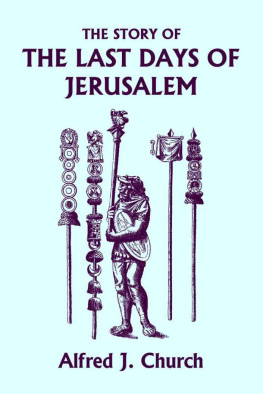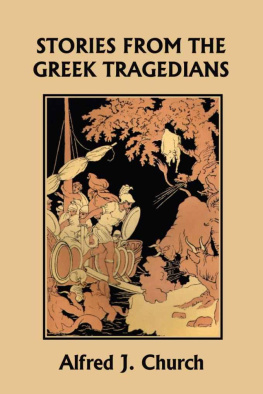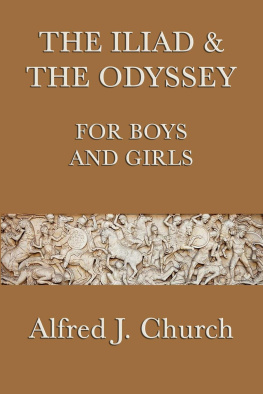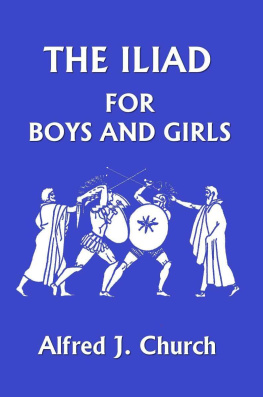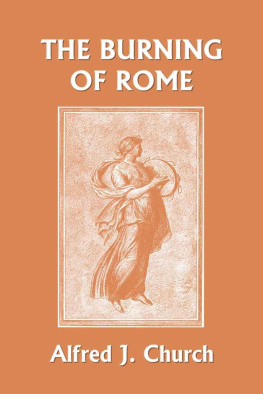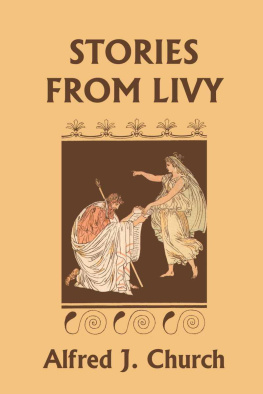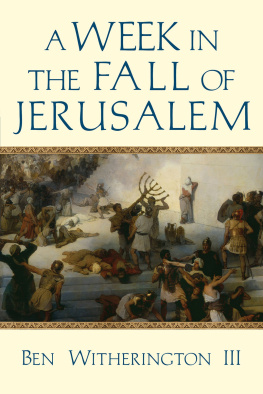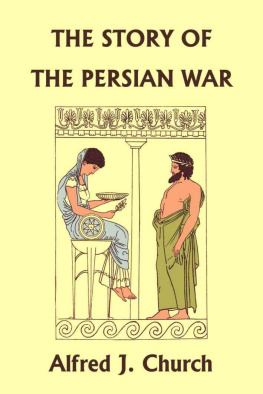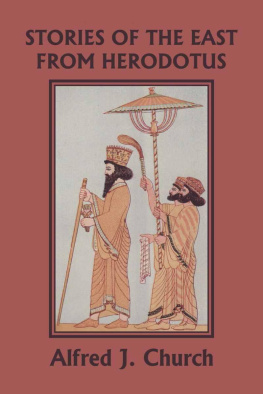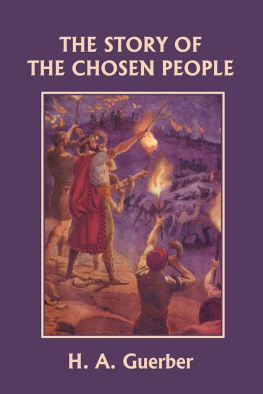Last Days of Jerusalem
by
Alfred J. Church
Yesterday's Classics
Chapel Hill, North Carolina
Cover and Arrangement 2010 Yesterday's Classics, LLC
All rights reserved. No part of this book may be reproduced or retransmitted in any form or by any means without the written permission of the publisher.
This edition, first published in 2010 by Yesterday's Classics, an imprint of Yesterday's Classics, LLC, is an unabridged republication of the work originally published by Selley & Co. in 1903. This title is available in a print edition (ISBN 978-1-59915-333-9).
Yesterday's Classics, LLC
PO Box 3418
Chapel Hill, NC 27515
Yesterday's Classics
Yesterday's Classics republishes classic books for children from the golden age of children's literature, the era from 1880 to 1920. Many of our titles are offered in high-quality paperback editions, with text cast in modern easy-to-read type for today's readers. The illustrations from the original volumes are included except in those few cases where the quality of the original images is too low to make their reproduction feasible. Unless specified otherwise, color illustrations in the original volumes are rendered in black and white in our print editions.
Contents
CHAPTER I
Of the Beginnings of the Jewish War
I N the fourteenth year of Nero Csar, Gessius Florus came down into the province of Juda to be Governor in the room of Albinus. This Albinus had been evil spoken of for his greed and wrongdoing, but Florus far surpassed him in wickedness; for indeed he plundered whole cities and regions, nor did he refuse any man licence to rob his neighbours if only he might obtain for himself a share of the spoil.
In the beginning of the second year of Florus, Cestius Gallus, Proconsul of Syria, came to Jerusalem at the Feast of the Passover. And when the people thronged about him, making loud outcry against Florus, and praying that he would help them, Florus, who was standing at his right hand, mocked them. Nevertheless Cestius spake them fair, promising that he would speak for them to Florus, that he might deal more mercifully with them in time to come. And indeed Florus, going with him as far as Csarea, made many promises that he would behave himself more mercifully. Yet had he resolved in his heart that he would multiply his cruelties, that so he might drive the people into war. For he knew that, if there should be peace, the people would accuse him of his misdeeds to the Emperor, but that if there should be war, there would be no thought or remembrance of such things. Having, therefore, this purpose in his heart, he sent messengers to take seventeen talents out of the treasury of the Temple, pretending that the Emperor had need of them. But when the messengers showed their errand, immediately the whole City was in an uproar, the multitude of the people rushing to the Temple, and crying out against the tyranny of Florus. Some also of the young men went about with a basket, asking alms for the Governor as though he were a beggar. Florus, so soon as he heard these things, marched to Jerusalem with an army of horse and foot. And when the people came forth to meet him, for they would fain have pacified him, he repulsed them with violence, and commanded his soldiers to disperse the crowd. And the next day, sitting on the seat of judgment, he called before him the chief men of the City and bade them deliver up to him them that had been their leaders in the tumult, and them that had insulted him. But when he found that the guilty were not given up to him, for indeed all were guilty, not heeding the excuses and entreaties of the multitude, he gave over to his soldiers the Upper City to plunder, bidding them also slay whomsoever they might meet; which thing they did so zealously that all Jerusalem was filled with robbery and murder. Also Florus seized men of renown in the City, of whom some were Roman knights, and commanded that they should be shamefully beaten before his judgment seat, and afterwards crucified.
Now it chanced that in these days Berenice, sister to King Agrippa, was in Jerusalem, who being greatly troubled at the doings of the soldiers, sent certain of her body-guard and captains many times to Florus, entreating him that he would have mercy upon the people. But Florus paid no heed to them; nay, when the Queen went herself and stood barefooted before his tribunal, neither he nor his soldiers regarded her, but put the prisoners to the torture, and slew them even before her eyes; and doubtless they would have slain her also, but that she escaped with her guard into the palace, and there abode for that night in great fear of death.
The next day the multitude of the people were gathered together in the market-place of the Upper City, lamenting over them that had been slain, and crying out against Florus. Nevertheless when the princes and the priests besought them that they would give no occasion to the Governor, they went peacefully to their homes. But he, desiring to stir up strife, sent to the chief men of the City, and said to them:"If ye now be earnest for peace, go forth, and meet the soldiers that are now coming to the City, and salute them as friends." But he sent privately to the centurions, commanding that the soldiers should not take any heed of the salutations of the people. And this they did; for when the people, coming forth from the City with the priests and chief men, greeted them with all friendship, they answered nothing. This stirred up great wrath in the multitude, so that they cried out against Florus; whereupon the soldiers made at them with their clubs, chasing them back to the City, and many fell under the clubs, and yet more were trampled by the crowd.
Nevertheless when Florus would have taken possession of the Temple, the people cast stones and javelins upon the soldiers from the roofs of the houses, and beat them back; also they broke down the cloisters that were between the Tower of Antony and the Temple; which when the Governor perceived, he ceased from his purpose; and in a little space he departed to Csarea, leaving one cohort only for a guard to the City. Afterwards he sent letters to Cestius, accusing the Jews, and laying to their charge the very things which he had himself done against them; which letters when Cestius had read, he sent one of his captains to Jerusalem to inquire into the truth of these matters. And when this man was come he went through the whole City, beginning at Siloam, taking with him one attendant onlyfor the chief of the people had persuaded him, through King Agrippa, that he should do this. And when he had seen that the people were peaceably disposed, he went up to the Temple, in which place many were assembled. And having praised them and exhorted them to live quietly, he returned to Cestius.
But the chief of the people took counsel with King Agrippa, whether they should send orators to accuse Florus before Csar. This the King liked not, but was minded rather to exhort the people that they should submit themselves to the Romans. The multitude, therefore, being assembled on the terrace, Agrippa stood forth and spake to them many words concerning the power and greatness of the Romans, and how that they were now masters of the whole world, and persuaded them that they should submit themselves quietly. And when he had made an end of speaking, he lifted up his voice and wept, as also did Queen Berenice his sister. Thereat the people were much moved; and they cried out, "We war not against the Romans, but against Florus, for the wrong that he hath done to us." To this King Agrippa made answer, "Not so, if one look to deeds rather than to words. Your tribute ye have not paid, and ye have broken down the cloisters between the Tower of Antony and the Temple. These things ye have not done against Florus, but against Csar. Do ye therefore pay the tribute and build again the cloisters."

